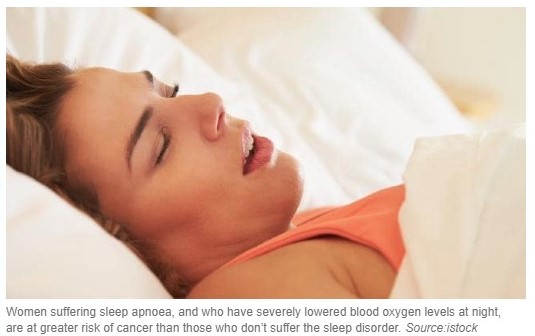New findings suggest the annoying trait could be linked to the disease — in women.
Women suffering sleep apnoea, and who had severely lowered blood oxygen levels at night, were at greater risk of cancer than those who didn’t suffer the sleep disorder, scientists in Greece discovered.
But, the same trend was not seen in men, they noted.
Dr Athanasia Pataka, said: “Recent studies have shown that low blood oxygen levels during the night and disrupted sleep, which are both common in obstructive sleep apnoea (OSA), may play an important role in the biology of different types of cancers.
“But this area of research is very new, and the effects of gender on the link between OSA and cancer have not been studied in detail before.”
Dr Pataka’s team at Aristotle University of Thessaloniki looked at more than 19,000 people — recording their age, BMI, smoking status and booze consumption — all of which can increase the risk of cancer.
They then recorded how often each volunteer experienced partial or complete closure of their airways, per hour of sleep, and how many times their blood oxygen levels dropped below 90 per cent.
Cancer was more common in women with OSA than blokes with the same condition, even when all the other factors were taken into account.
The findings, published in the European Respiratory Journal, showed 388 people were diagnosed with a serious cancer — 160 women and 228 men.
The most common cancer in women was breast, while prostate cancer was most likely in men.
“This link was especially strong in the women that we analysed and less so in the men,” Dr Pataka said.
“It suggests that severe OSA could be an indicator for cancer in women, though more research is needed to confirm these findings.”

The researchers didn’t specifically look at the causes of different cancers.
Dr Pakata added: “Cancer may differ between men and women because of factors such as how hormones affect tumour growth, how the different types of cancer that were more prevalent in men and women are affected by low blood oxygen levels, or how gender-specific exposure to cigarette smoking may play a role.
“The classic symptoms of OSA such as sleepiness, snoring and stopping breathing during the night time are reported more frequently in men, but other lesser known symptoms like fatigue, insomnia, depression and morning headaches are more common in women.
“Clinicians should be more careful with evaluation of their female patients for possible OSA.”
Professor Anita Simonds, from the Royal Brompton and Harefield NHS Foundation Trust and vice-president of the European Respiratory Society said: “This study adds to the growing evidence on the possible link between the effects of OSA, such as low blood oxygen levels, and the risk of developing cancer and provides new data on potential gender differences.
“In this study the overall cancer prevalence was low at just 2 per cent, therefore OSA patients should not be alarmed by this research.
“Clinicians should continue to be vigilant when assessing patients with possible OSA, especially among women who may present with less common symptoms.
“Both female and male OSA patients should be advised to adhere to therapy and follow a healthy lifestyle to manage their condition most effectively, including by being physically active, achieving ideal body weight, limiting alcohol use and not smoking.”
One of the limitations of the study was researchers didn’t account for other factors that might affect cancer risk, such as exercise levels, marital status, education level and occupation.
The findings do show a link between OSA and cancer, but they don’t prove OSA causes an increased risk of cancer — so more research is needed.
This article originally appeared on The Sun and was reproduced with permission
Source Form: NEWS.COM.AU https://www.news.com.au/lifestyle/health/health-problems/snoring-or-waking-up-exhausted-could-be-early-warning-sign-of-cancer/news-story/f80278fe07ca49339c17da856224f8e8









